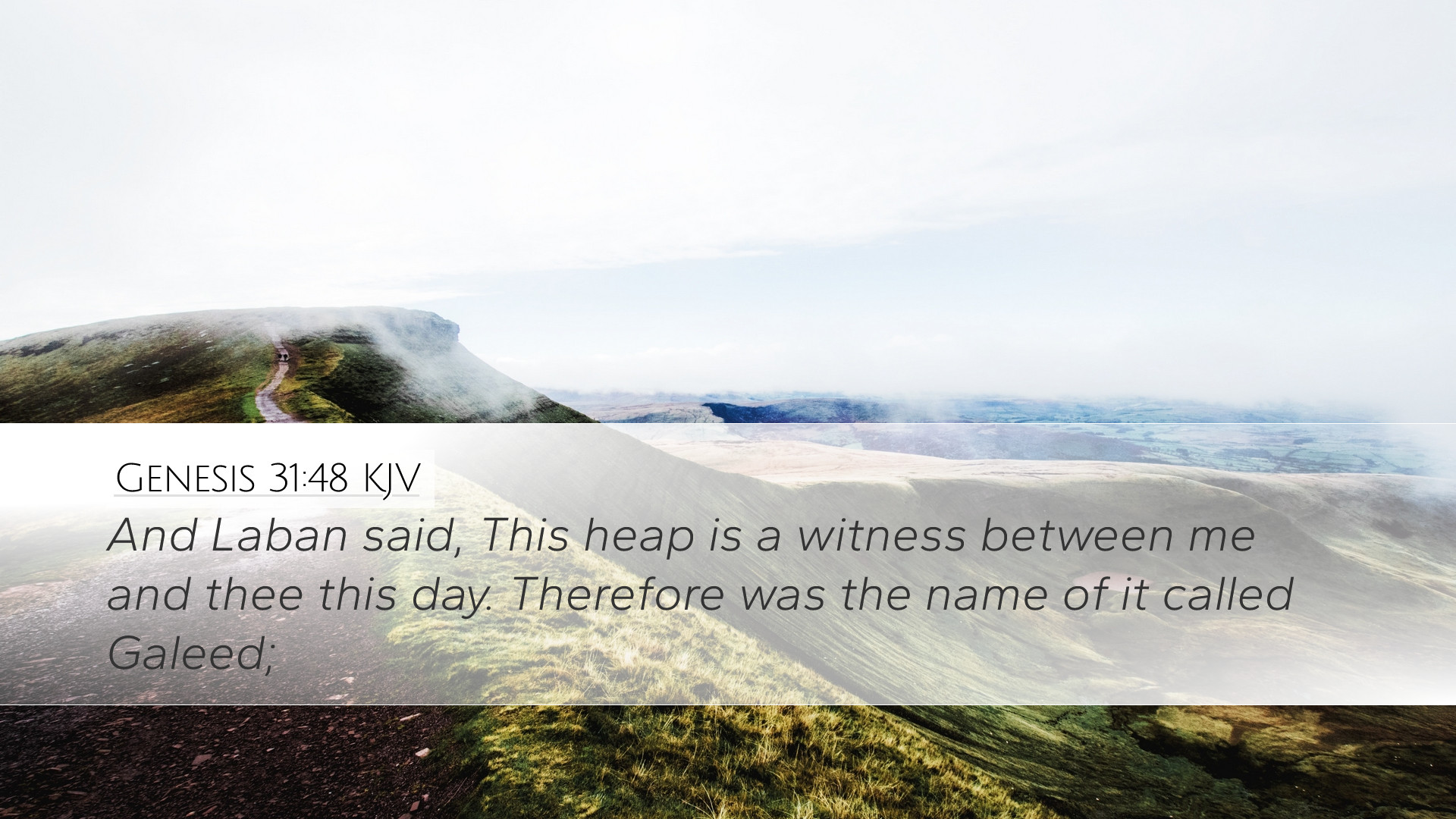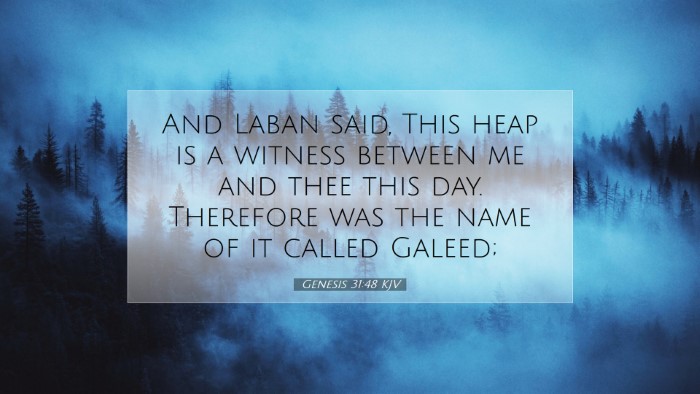Commentary on Genesis 31:48
Verse Text: "And Laban said, This heap is a witness between me and thee this day. Therefore was the name of it called Galeed."
Introduction
Genesis 31:48 marks a significant moment of covenantal agreement between Laban and Jacob, encapsulating themes of witness, boundary, and the relational dynamics that characterize their interactions. This verse represents not only a physical marker in the narrative but also metaphorical implications regarding trust, integrity, and divine oversight. The following commentary synthesizes insights from renowned public domain sources, providing a holistic understanding for pastors, students, and theologians alike.
Context of the Passage
In the broader context of Genesis 31, Jacob flees from Laban after years of service, driven by divine instruction to return to his homeland. Laban pursues Jacob, prompted by a mixture of familial concern and the desire to reclaim stolen goods. The meeting between Laban and Jacob is charged with both confrontation and the establishment of a new relationship framework.
Matthew Henry's Insights
Henry emphasizes the significance of the heap of stones, which he describes as a tangible symbol of their covenant. He notes that this heap served dual purposes: as a boundary marker and a visible witness to the promise made. Laban’s declaration of the heap being a testimony reflects the solemnity of the agreement, and it denotes Laban's acknowledgment of the divine involvement in their affairs. Henry asserts that this act signifies a transition from past hostilities to a new understanding of mutual respect.
Albert Barnes' Perspective
Barnes focuses on the cultural and historical context of the naming of Galeed. He points out that in ancient Near Eastern customs, setting up a heap of stones often signified a formal agreement or covenant. The term "Galeed" translates to "witness heap," indicating that Laban and Jacob consciously created a reminder of their accord, designed to deter any future disputes over their respective territories. Barnes also relates this moment to the overarching theme of God's providence in Jacob’s journey, portraying the heap as evidence of God’s protective hand over Jacob's life.
Adam Clarke's Theological View
Clarke elaborates on the significance of the name "Galeed" and the imperative of witnesses in covenant-making. He highlights that this moment illustrates the importance of accountability in relationships, particularly in matters involving trust. Clarke draws attention to Laban’s motives and the complex nature of his character. He indicates that while Laban seeks to impose a sense of control over Jacob, the establishment of Galeed ultimately serves to release Jacob from fear, paving the way for his future endeavors. Clarke offers a theological reflection on God's hand in establishing order in the midst of human conflict.
Theological Implications
This verse invites several theological reflections, particularly concerning the character of God and His active role in human affairs:
- Divine Witness: The naming of the heap as a witness resonates with the biblical theme of God as an observer and participant in covenant relationships (Genesis 9:15, Exodus 20:7). Christians are reminded that their agreements are ultimately observed by God, lending ethical weight to their commitments.
- Covenantal Relationships: The interaction exemplifies the nature of covenants in Scripture. It points to the seriousness of commitments made between individuals and serves as a precursor to later biblical covenant stories, illuminating themes of loyalty and fidelity.
- Boundary and Identity: The physical boundary established underscores human desire for safety and identity. Jacob’s theft and subsequent agreement with Laban illustrate the quest for belonging and the establishment of personal legacy in a world of relational tensions.
Practical Application for Modern Believers
The implications of Genesis 31:48 offer several applications for contemporary believers:
- Commitment to Integrity: In dealings with others, whether in business or personal relationships, Christians are called to honor commitments and engage in practices that promote trust and accountability.
- Respecting Boundaries: The imperative of boundaries highlighted in this passage encourages believers to understand the need for healthy relationships, reinforcing the belief that maintaining distance at times can be integral to preserving integrity and peace.
- Divine Providence: Reflecting on God's guidance in Jacob’s journey inspires confidence in God’s continued stewardship and protection over believers as they navigate their own life's challenges.
Conclusion
Genesis 31:48 serves as a profound reminder of the importance of witness, integrity, and the role of divine authority in human relationships. By exploring the rich insights from noted commentators, modern readers can draw deeper understanding from this pivotal moment in Scripture, strengthening their faith and enhancing their relational dynamics aligned with biblical principles.


